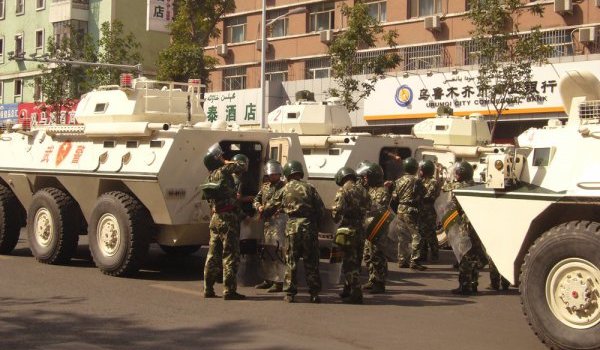Since April 2017, thousands of Uyghurs have been jailed or detained in re-education camps throughout the Xinjiang region. Accused of “extremist” or “politically incorrect” views, the 120,000 political prisoners are being held in horrible conditions; according to a security chief of the Kashgar prefecture. The sheer number of inmates is resulting in overcrowded cells, making it impossible for them to fully stretch their legs or even lay on their backs. The number of detainees reached such a high number that the local police is being told by camps’ officials to stop bringing more people.
The article below was published by Radio Free Asia:
Around 120,000 ethnic Uyghurs are currently being held in political re-education camps in Kashgar (in Chinese, Kashi) prefecture of northwest China’s Xinjiang region alone, according to a security official with knowledge of the detention system. Since April 2017, Uyghurs accused of harboring “extremist” and “politically incorrect” views have been jailed or detained in re-education camps throughout Xinjiang, where members of the ethnic group have long complained of pervasive discrimination, religious repression, and cultural suppression under Chinese rule.
Prior reporting by RFA’s Uyghur Service found that as arrests in Xinjiang increased around the sensitive 19th Communist Party Congress in Beijing in October, the region’s re-education camps have been inundated by detainees, who are forced to endure cramped and squalid conditions in the facilities.
The security chief of Kashgar city’s Chasa township recently told RFA on condition of anonymity that “approximately 120,000” Uyghurs are being held throughout the prefecture, based on information he has received from other area officials.
“I have great relationships with the heads of all the government departments and we are in regular contact, informing each other on the current situation,” he said, adding that he is also close with the prefecture’s chief of security.
Tens of thousands of people are detained within Kashgar city alone, the Chasa township security officer said, citing statistics from the city’s subdistricts. “Around 2,000 [are detained] from the four neighborhoods of Kashgar city, as well as an additional 30,000 in total from the city’s 16 villages,” he said.
Among Kashgar city’s four neighborhoods, the largest number of detainees—more than 500 people—are from Yawagh, while among its 16 villages, the largest number are from Yengi-osteng, he added, without providing specific details.
Kashgar city is home to four re-education camps, the security chief said, the largest of which was established in the city’s No. 5 Middle School in May 2017. “It’s located in the Shinka neighbourhood and is newly built,” he said.
“The plan was initially to build the new school in that area and transfer the current middle school students there. That is why it was named No. 5 Middle School.” Around 80 people are living in the school’s main hall, the security chief said, while 20-25 people sleep in each of its classrooms.
Sources say that authorities often convert government buildings and schools into makeshift re-education camps to deal with overcrowding, and routinely shift detainees between locations—that include prisons—without informing their family members.
In Bayin’gholin Mongol (Bayinguoleng Menggu) Autonomous Prefecture’s Korla city—where sources told RFA recently that as many as 1,000 people have been admitted to the city’s detention facilities over the course of a few days—a local government employee named Erkin Bawdun recently said that area re-education camps “are completely full.”
Bawdun said that a friend who spent time as an inmate at a local re-education camp told him he had seen officials from the center tell the police to “stop bringing people … as it is already too full.”
He described cells that had previously held eight people now accommodating 14 inmates, who “were not allowed pillows” and “had to lay on their sides because there was not enough room to lay flat,” let alone space to turn over or stretch their legs.
Other acquaintances told Bawdun that they had seen “detainees walking barefoot,” and that inmates were “not allowed clothes with buttons or metal zippers,” belts, shoelaces, or “even underwear” in some cases, despite average low temperatures of around 15 degrees Fahrenheit (-10 degrees Celsius) at night in December.
Since Xinjiang party chief Chen Quanguo was appointed to his post in August 2016, he has initiated unprecedented repressive measures against the Uyghur people and ideological purges against so-called “two-faced” Uyghur officials—a term applied by the government to Uyghurs who do not willingly follow directives and exhibit signs of “disloyalty.”
China regularly conducts “strike hard” campaigns in Xinjiang, including police raids on Uyghur households, restrictions on Islamic practices, and curbs on the culture and language of the Uyghur people, including videos and other material.
While China blames some Uyghurs for “terrorist” attacks, experts outside China say Beijing has exaggerated the threat from the Uyghurs and that repressive domestic policies are responsible for an upsurge in violence there that has left hundreds dead since 2009.
Source: unpo.org

Leave a Reply